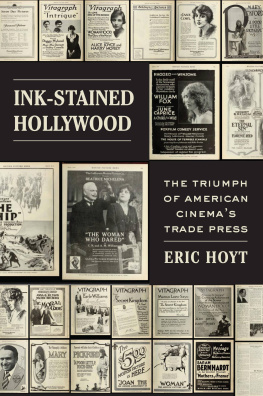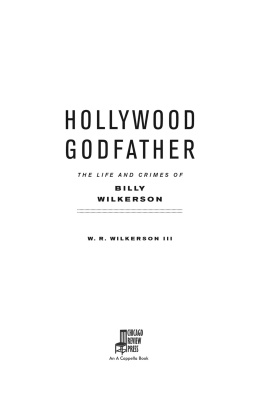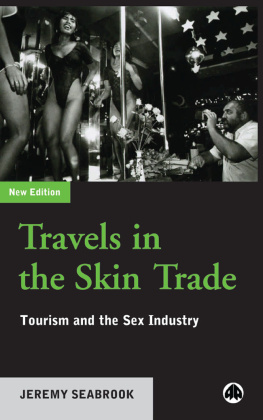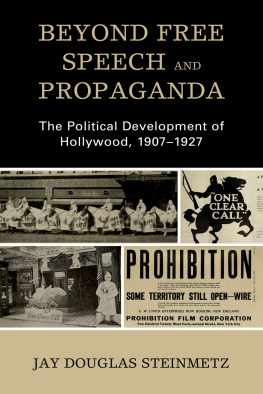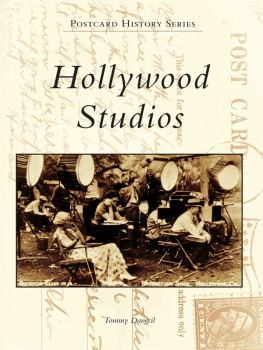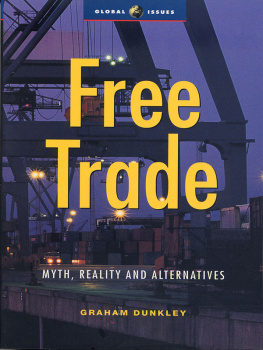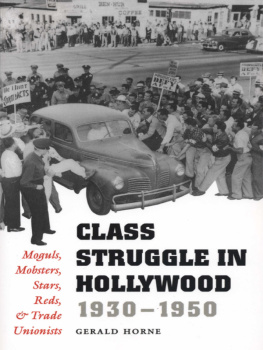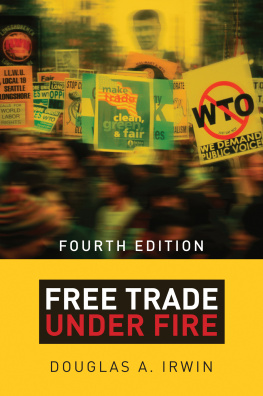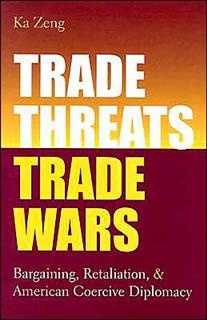Contents
Luminos is the Open Access monograph publishing program from UC Press. Luminos provides a framework for preserving and reinvigorating monograph publishing for the future and increases the reach and visibility of important scholarly work. Titles published in the UC Press Luminos model are published with the same high standards for selection, peer review, production, and marketing as those in our traditional program. www.luminosoa.org
Ink-Stained Hollywood
The publisher and the University of California Press Foundation gratefully acknowledge the generous support of the Kenneth Turan and Patricia Williams Endowment Fund in American Film.
Ink-Stained Hollywood
The Triumph of American Cinemas Trade Press

Eric Hoyt

UNIVERSITY OF CALIFORNIA PRESS
University of California Press
Oakland, California
2022 by Eric Hoyt
This work is licensed under a Creative Commons CC BY-NC-SA license. To view a copy of the license, visit http://creativecommons.org/licenses .
Suggested citation: Hoyt, E. Ink-Stained Hollywood: The Triumph of American Cinemas Trade Press . Oakland: University of California Press, 2022. DOI: https://doi.org/10.1525/luminos.122
Library of Congress Cataloging-in-Publication Data
Names: Hoyt, Eric, author.
Title: Ink-stained Hollywood : the triumph of American cinemas trade press / Eric Hoyt.
Description: Oakland, California : University of California Press, [2022] | Includes bibliographical references and index.
Identifiers: LCCN 2021040705 (print) | LCCN 2021040706 (ebook) | ISBN 9780520383692 (paperback) | ISBN 9780520383708 (ebook)
Subjects: LCSH: Journalism and motion pictures. | Motion picture industry CaliforniaLos AngelesHistory20th century.
Classification: LCC PN1993.5.U65 H79 2022 (print) | LCC PN1993.5.U65 (ebook) | DDC 791.4305 dc23
LC record available at https://lccn.loc.gov/2021040705
LC ebook record available at https://lccn.loc.gov/2021040706
31 30 29 28 27 26 25 24 23 22
10 9 8 7 6 5 4 3 2 1
For Esme, Arli, Liam, and Emily
CONTENTS
LIST OF FIGURES
LIST OF TABLES
LIST OF BOXES
ACKNOWLEDGMENTS
This book developed over many years, with the help of many people, organizations, and institutions. I will never be able to adequately thank them all. What follows represents my best attempt.
The research and writing of Ink-Stained Hollywood has been inextricably linked to my role in leading the Media History Digital Library (MHDL). Thank you to the MHDLs founding director, David Pierce, for his vision and tenacity in building this project. I have been honored to be part of it. I am grateful to David for teaching me so much and for trusting me to lead the MHDL forward.
To build this collection, we borrowed and scanned books, magazines, and trade papers from a number of leading film heritage institutions, including the Library of Congress Motion Picture, Broadcasting, and Recorded Sound Division; Museum of Modern Art Library; Academy of Motion Picture Arts and Sciences Margaret Herrick Library; University of Maryland, College Park; Berkeley Art Museum and Pacific Film Archive; Prelinger Library; and Wisconsin Center for Film and Theater Research. The contributions of private collectors, particularly Karl Thiede, Eileen Bowser, and Richard Koszarski, were also vital. Thank you to all these institutions and individuals for generously lending the MHDL your materialsmany of which are analyzed in this book. My deep thanks also extend to the Internet Archive, which served as a vendor for most of the scanning and continues to host and preserve the MHDLs digital files.
The MHDLs operations have been financially supported by the contributions of many organizations and individuals, including the Mary Pickford Foundation, California Digital Library, Columbia University Library, Domitor, University of Zurich, Matthew and Natalie Bernstein, Q. David Bowers, Stephen P. Jarchow, Jeff Joseph, Charlie Keil, John McElwee, Russell Merritt, Northwestern University in Qatar Library, Richard Scheckman, David Sorochty, David Stenn, University of South Carolina, University of St. Andrews Library and Centre for Film Studies, and an anonymous donor in memory of Carolyn Hauer. Grant funding from the American Council of Learned Societies, Institute of Museum and Library Services, National Endowment for the Humanities, and Social Sciences and Humanities Research Council of Canada has enabled significant enhancements to the MHDLs collections, capabilities, and platforms. Without the support of these sponsors, neither the MHDL nor this book would exist.
In addition to scanning and funding, the MHDL has depended on the hard work of a brilliant team of people. Carl Hagenmaier and Wendy Hagenmaier were instrumental in the development of the Lantern search engine. Thanks also go to Edward Betts, Andy Myers, Joseph Pomp, and Anne Helen Petersen for their contributions to Lanterns success. Charles Acland, Kevin Ponto, and Alex Peer were vital collaborators on the Arclight app. Robert Farr was crucial in formulating and implementing a social media strategy. Keeping our servers and database going would have been impossible without the dedication and expertise of Peter Sengstock and Samuel Hansen.
Over the past nine years, I have benefited enormously from the graduate students at the University of WisconsinMadison who have supported the MHDL and my work on this book. No amount of thanks will ever be sufficient for Derek Long, Kit Hughes, and Tony Tran, who, from 2013 to 2017, collaborated with me on the completion of Lantern, the development of the Arclight app, and the coauthorship of several research publications (sections from one of which, Variety s Transformations, is adapted from and reproduced in this book). My thanks also go to JJ Bersch, Matt St. John, Maureen Mauk, Caroline Meikle, Jacob Mertens, Connor Perkins, and Olivia Johnston Riley for their work in digitizing some of the sources that are discussed in this book (and are now available on the MHDL). Laurel Gildersleeve, Caroline Leader, and Austin Morris kindly visited out-of-town archival collections on my behalf when I was not able to travel in person. Last, but not least, thank you to Lesley Stevenson, who was absolutely clutch when it came time to prepare the final book manuscript. I am so lucky to have been able to work with all of you.
In UW-Madisons Department of Communication Arts, I am fortunate to work with an extraordinary group of colleagues. I would like to thank the Media and Cultural Studies and Film faculty and academic staffJonathan Gray, Michele Hilmes, Derek Johnson, Lori Kido Lopez, Jason Kido Lopez, Jeremy Morris, Jennifer Hyland Wang, David Bordwell, Kelley Conway, Lisa Ellis, Aaron Greer, Erik Gunneson, Lea Jacobs, Vance Kepley, Darshana Mini, J. J. Murphy, Ben Singer, Jeff Smith, and Kristin Thompsonfor the intellectual and creative community that makes this work possible (and fun). My thanks also go to the Wisconsin Center for Film and Theater Research team, Mary Huelsbeck and Amanda Smith, for their collaboration and all they have taught me in our work together.
This book and the MHDL have further benefited from substantial institutional support. Support for this research was provided by the University of WisconsinMadison Office of the Vice Chancellor for Research and Graduate Education, with funding from the Wisconsin Alumni Research Foundation. Trips to visit archives, time to think and write, and the open access publishing subvention were all made possible thanks to this support. UW-Madisons College of Letters and Science and the generous research endowment from Kelly and Kimberly Kahl supported the completion of this book and the expansion of the MHDL. Thank you as well to my friends at the UW Libraries and Wisconsin Historical Society for all the guidance they have offered over the years.

